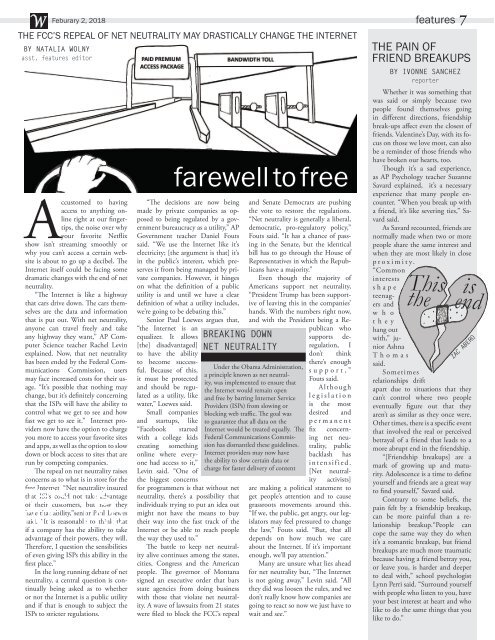You also want an ePaper? Increase the reach of your titles
YUMPU automatically turns print PDFs into web optimized ePapers that Google loves.
W Feburary 2, <strong>2018</strong> features 7<br />
THE FCC’S REPEAL OF NET NEUTRALITY MAY DRASTICALLY CHANGE THE INTERNET<br />
BY NATALIA WOLNY<br />
THE PAIN OF<br />
asst. features editor<br />
FRIEND BREAKUPS<br />
Accustomed to having<br />
access to anything online<br />
right at our fingertips,<br />
the noise over why<br />
your favorite Netflix<br />
show isn’t streaming smoothly or<br />
why you can’t access a certain website<br />
is about to go up a decibel. The<br />
Internet itself could be facing some<br />
dramatic changes with the end of net<br />
neutrality.<br />
“The Internet is like a highway<br />
that cars drive down. The cars themselves<br />
are the data and information<br />
that is put out. With net neutrality,<br />
anyone can travel freely and take<br />
any highway they want,” AP Computer<br />
Science teacher Rachel Levin<br />
explained. Now, that net neutrality<br />
has been ended by the Federal Communications<br />
Commission, users<br />
may face increased costs for their usage.<br />
“It’s possible that nothing may<br />
change, but it’s definitely concerning<br />
that the ISPs will have the ability to<br />
control what we get to see and how<br />
fast we get to see it.” Internet providers<br />
now have the option to charge<br />
you more to access your favorite sites<br />
and apps, as well as the option to slow<br />
down or block access to sites that are<br />
run by competing companies.<br />
The repeal on net neutrality raises<br />
concerns as to what is in store for the<br />
free Internet. “Net neutrality insured<br />
that ISPs could not take advantage<br />
THIS<br />
of their customers, but ISnow they<br />
have that ability,”senior Paul Loewes<br />
THE said. “It is reasonable END to think that<br />
if a company has the ability to take<br />
advantage of their powers, they will.<br />
Therefore, I question the sensibilities<br />
of even giving ISPs this ability in the<br />
first place.”<br />
In the long running debate of net<br />
neutrality, a central question is continually<br />
being asked as to whether<br />
or not the Internet is a public utility<br />
and if that is enough to subject the<br />
ISPs to stricter regulations.<br />
“The decisions are now being<br />
made by private companies as opposed<br />
to being regulated by a government<br />
bureaucracy as a utility,” AP<br />
Government teacher Daniel Fouts<br />
said. “We use the Internet like it’s<br />
electricity; [the argument is that] it’s<br />
in the public’s interest, which preserves<br />
it from being managed by private<br />
companies. However, it hinges<br />
on what the definition of a public<br />
utility is and until we have a clear<br />
definition of what a utility includes,<br />
we’re going to be debating this.”<br />
Senior Paul Loewes argues that,<br />
“the Internet is an<br />
equalizer. It allows<br />
[the] disadvantaged]<br />
to have the ability<br />
to become successful.<br />
Because of this,<br />
it must be protected<br />
and should be regulated<br />
as a utility, like<br />
water,” Loewes said.<br />
Small companies<br />
and startups, like<br />
farewell to free<br />
BREAKING DOWN<br />
NET NEUTRALITY<br />
“Facebook started<br />
with a college kids<br />
creating something<br />
online where everyone<br />
had access to it,”<br />
Levin said. “One of<br />
the biggest concerns<br />
for programmers is that without net<br />
neutrality, there’s a possibility that<br />
individuals trying to put an idea out<br />
might not have the means to buy<br />
their way into the fast track of the<br />
Internet or be able to reach people<br />
the way they used to.”<br />
The battle to keep net neutrality<br />
alive continues among the states,<br />
cities, Congress and the American<br />
people. The governor of Montana<br />
signed an executive order that bars<br />
state agencies from doing business<br />
with those that violate net neutrality.<br />
A wave of lawsuits from 21 states<br />
were filed to block the FCC’s repeal<br />
and Senate Democrats are pushing<br />
the vote to restore the regulations.<br />
“Net neutrality is generally a liberal,<br />
democratic, pro-regulatory policy,”<br />
Fouts said. “It has a chance of passing<br />
in the Senate, but the identical<br />
bill has to go through the House of<br />
Representatives in which the Republicans<br />
have a majority.”<br />
Even though the majority of<br />
Americans support net neutrality,<br />
“President Trump has been supportive<br />
of leaving this in the companies’<br />
hands. With the numbers right now,<br />
and with the President being a Republican<br />
who<br />
Under the Obama Administration,<br />
a principle known as net neutrality,<br />
was implemented to ensure that<br />
the Internet would remain open<br />
and free by barring Internet Service<br />
Providers (ISPs) from slowing or<br />
blocking web traffic. The goal was<br />
to guarantee that all data on the<br />
Internet would be treated equally. The<br />
Federal Communications Commission<br />
has dismantled these guidelines.<br />
Internet providers may now have<br />
the ability to slow certain data or<br />
charge for faster delivery of content<br />
supports deregulation,<br />
I<br />
don’t think<br />
there’s enough<br />
support,”<br />
Fouts said.<br />
Although<br />
legislation<br />
is the most<br />
desired and<br />
permanent<br />
fix concerning<br />
net neutrality,<br />
public<br />
backlash has<br />
intensified.<br />
[Net neutrality<br />
activists]<br />
are making a political statement to<br />
get people’s attention and to cause<br />
grassroots movements around this.<br />
“If we, the public, get angry, our legislators<br />
may feel pressured to change<br />
the law,” Fouts said. “But, that all<br />
depends on how much we care<br />
about the Internet. If it’s important<br />
enough, we’ll pay attention.”<br />
Many are unsure what lies ahead<br />
for net neutrality but, “The Internet<br />
is not going away,” Levin said. “All<br />
they did was loosen the rules, and we<br />
don’t really know how companies are<br />
going to react so now we just have to<br />
wait and see.”<br />
BY IVONNE SANCHEZ<br />
reporter<br />
Whether it was something that<br />
was said or simply because two<br />
people found themselves going<br />
in different directions, friendship<br />
break-ups affect even the closest of<br />
friends. Valentine’s Day, with its focus<br />
on those we love most, can also<br />
be a reminder of those friends who<br />
have broken our hearts, too.<br />
Though it’s a sad experience,<br />
as AP Psychology teacher Suzanne<br />
Savard explained, it’s a necessary<br />
experience that many people encounter.<br />
“When you break up with<br />
a friend, it’s like severing ties,” Savard<br />
said.<br />
As Savard recounted, friends are<br />
normally made when two or more<br />
people share the same interest and<br />
when they are most likely in close<br />
proximity.<br />
“Common<br />
interests<br />
This is<br />
the end<br />
shape<br />
teenagers<br />
and<br />
w h o<br />
they<br />
hang out<br />
with,” junior<br />
Ashna<br />
Thomas<br />
said.<br />
Sometimes<br />
relationships drift<br />
apart due to situations that they<br />
can’t control where two people<br />
eventually figure out that they<br />
aren’t as similar as they once were.<br />
Other times, there is a specific event<br />
that involved the real or perceived<br />
betrayal of a friend that leads to a<br />
more abrupt end in the friendship.<br />
“[Friendship breakups] are a<br />
mark of growing up and maturity.<br />
Adolescence is a time to define<br />
yourself and friends are a great way<br />
to find yourself,” Savard said.<br />
Contrary to some beliefs, the<br />
pain felt by a friendship breakup,<br />
can be more painful than a relationship<br />
breakup.“People can<br />
cope the same way they do when<br />
it’s a romantic breakup, but friend<br />
breakups are much more traumatic<br />
because having a friend betray you,<br />
or leave you, is harder and deeper<br />
to deal with,” school psychologist<br />
Lynn Perri said. “Surround yourself<br />
with people who listen to you, have<br />
your best interest at heart and who<br />
like to do the same things that you<br />
like to do.”<br />
ZAC ABERO


















